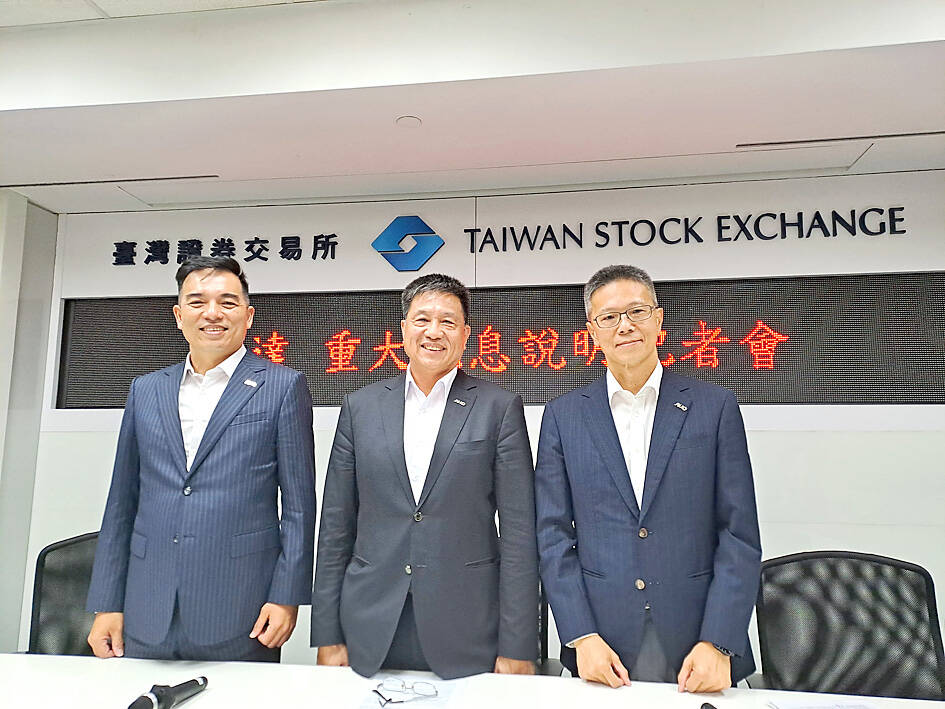AUO Corp (友達) on Monday said it would fully acquire Germany’s Behr-Hella Thermocontrol GmbH (BHTC) for 600 million euros (US$628.6 million) as the Taiwanese flat-panel maker accelerates its expansion into the auto parts market.
The deal would enable AUO to extend its business from vehicle display solutions to BHTC’s intelligent cockpit operation system solutions and other automotive applications, the company said.
“Acquiring BHTC is significant for AUO’s expansion in the automotive market, which is an area with strong growth potential,” AUO chairman Paul Peng (彭?浪) told a news conference in Taipei.

Photo: CNA
Peng said the deal would allow AUO to expand its manufacturing sites globally sooner, as BHTC manages factories in Europe, North America, India and China.
It also represents a vital step for the company to diversify from the flat-panel business, which is famous for its boom-and-bust cycles, he said.
The company has viewed electric mobility as becoming a standout industry in the next 10 years with strong growth potential, AUO president Frank Ko (柯富仁) said.
The deal would help enhance the company’s supply of intelligent cockpit operation system solutions and fuel its growth over the next few years, Ko said.
“AUO should benefit from the acquisition of BHTC in the mid-to-long term,” researcher TrendForce Corp (集邦科技) said yesterday, referring to BHTC’s customer base and global deployment.
TrendForce said the deal would help AUO enter a new business segment, as BHTC is the world leader in climate control units and an expert in human-machine interface solutions.
BHTC counts Audi AG, Bentley Motors Ltd, BMW AG, Tata Motor Ltd, Mercedes-Benz AG and Nissan Motor Co among its customers, the company’s Web site showed. It generated 619 million euros in revenue last year.
AUO plans to acquire the German company in cash, given its strong cash position totaling NT$90.5 billion (US$2.8 billion) as of June 30.
The deal would not negatively affect the company’s financial health, AUO chief financial officer Benjamin Tseng (曾昱智) said, adding that BHTC has been generating cash from its operations over the past three years.
The acquisition is subject to antitrust and regulatory approval in Taiwan, Germany and Mexico, AUO said.
It expects the deal to close by the middle of next year.

Taiwan Semiconductor Manufacturing Co (TSMC, 台積電), the world’s biggest contract chipmaker, booked its first-ever profit from its Arizona subsidiary in the first half of this year, four years after operations began, a company financial statement showed. Wholly owned by TSMC, the Arizona unit contributed NT$4.52 billion (US$150.1 million) in net profit, compared with a loss of NT$4.34 billion a year earlier, the statement showed. The company attributed the turnaround to strong market demand and high factory utilization. The Arizona unit counts Apple Inc, Nvidia Corp and Advanced Micro Devices Inc among its major customers. The firm’s first fab in Arizona began high-volume production

VOTE OF CONFIDENCE: The Japanese company is adding Intel to an investment portfolio that includes artificial intelligence linchpins Nvidia Corp and TSMC Softbank Group Corp agreed to buy US$2 billion of Intel Corp stock, a surprise deal to shore up a struggling US name while boosting its own chip ambitions. The Japanese company, which is adding Intel to an investment portfolio that includes artificial intelligence (AI) linchpins Nvidia Corp and Taiwan Semiconductor Manufacturing Co (TSMC, 台積電), is to pay US$23 a share — a small discount to Intel’s last close. Shares of the US chipmaker, which would issue new stock to Softbank, surged more than 5 percent in after-hours trading. Softbank’s stock fell as much as 5.4 percent on Tuesday in Tokyo, its

The prices of gasoline and diesel at domestic fuel stations are to rise NT$0.1 and NT$0.4 per liter this week respectively, after international crude oil prices rose last week, CPC Corp, Taiwan (台灣中油) and Formosa Petrochemical Corp (台塑石化) announced yesterday. Effective today, gasoline prices at CPC and Formosa stations are to rise to NT$27.3, NT$28.8 and NT$30.8 per liter for 92, 95 and 98-octane unleaded gasoline respectively, the companies said in separate statements. The price of premium diesel is to rise to NT$26.2 per liter at CPC stations and NT$26 at Formosa pumps, they said. The announcements came after international crude oil prices

SETBACK: Apple’s India iPhone push has been disrupted after Foxconn recalled hundreds of Chinese engineers, amid Beijing’s attempts to curb tech transfers Apple Inc assembly partner Hon Hai Precision Industry Co (鴻海精密), also known internationally as Foxconn Technology Group (富士康科技集團), has recalled about 300 Chinese engineers from a factory in India, the latest setback for the iPhone maker’s push to rapidly expand in the country. The extraction of Chinese workers from the factory of Yuzhan Technology (India) Private Ltd, a Hon Hai component unit, in southern Tamil Nadu state, is the second such move in a few months. The company has started flying in Taiwanese engineers to replace staff leaving, people familiar with the matter said, asking not to be named, as the